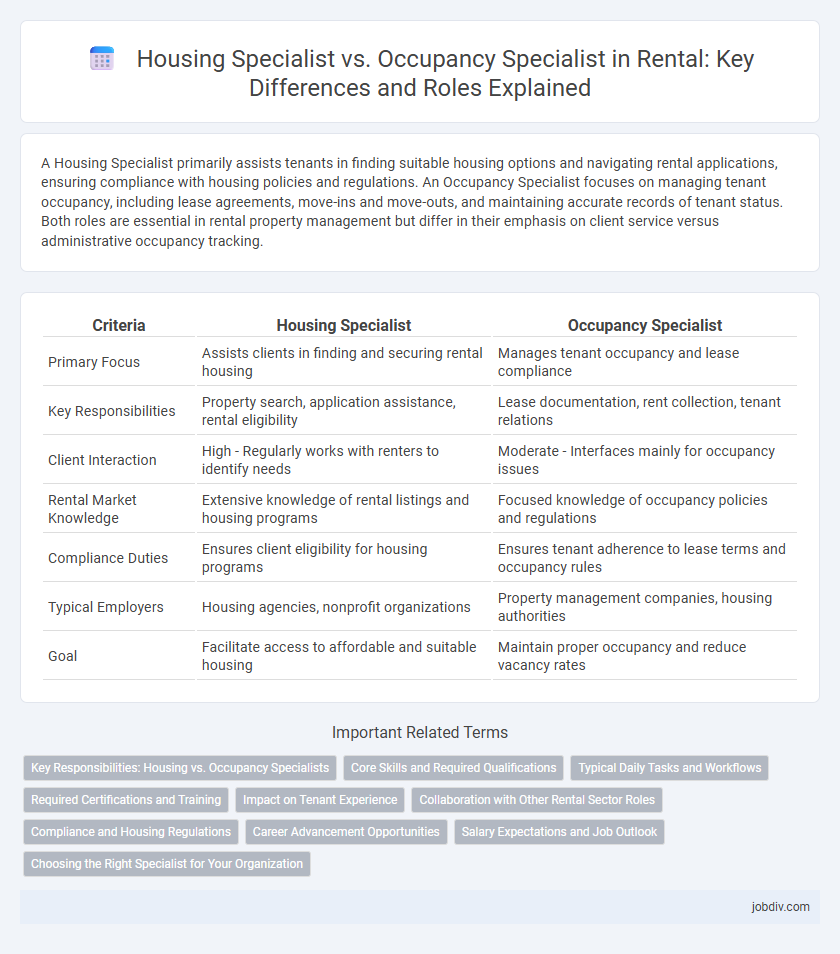A Housing Specialist primarily assists tenants in finding suitable housing options and navigating rental applications, ensuring compliance with housing policies and regulations. An Occupancy Specialist focuses on managing tenant occupancy, including lease agreements, move-ins and move-outs, and maintaining accurate records of tenant status. Both roles are essential in rental property management but differ in their emphasis on client service versus administrative occupancy tracking.
Table of Comparison
| Criteria | Housing Specialist | Occupancy Specialist |
|---|---|---|
| Primary Focus | Assists clients in finding and securing rental housing | Manages tenant occupancy and lease compliance |
| Key Responsibilities | Property search, application assistance, rental eligibility | Lease documentation, rent collection, tenant relations |
| Client Interaction | High - Regularly works with renters to identify needs | Moderate - Interfaces mainly for occupancy issues |
| Rental Market Knowledge | Extensive knowledge of rental listings and housing programs | Focused knowledge of occupancy policies and regulations |
| Compliance Duties | Ensures client eligibility for housing programs | Ensures tenant adherence to lease terms and occupancy rules |
| Typical Employers | Housing agencies, nonprofit organizations | Property management companies, housing authorities |
| Goal | Facilitate access to affordable and suitable housing | Maintain proper occupancy and reduce vacancy rates |
Key Responsibilities: Housing vs. Occupancy Specialists
Housing Specialists manage client assessments, lease agreements, and compliance with housing regulations to ensure suitable living arrangements. Occupancy Specialists focus on verifying tenant eligibility, processing move-ins and move-outs, and maintaining accurate occupancy records. Both roles are critical for seamless rental operations, with Housing Specialists emphasizing client support and regulatory adherence, while Occupancy Specialists prioritize tenant verification and unit turnover.
Core Skills and Required Qualifications
Housing Specialists excel in case management, tenant advocacy, and compliance with housing regulations, requiring strong interpersonal skills and knowledge of fair housing laws. Occupancy Specialists focus on lease administration, rent collection, and property inspections, demanding expertise in property management software and attention to detail. Both roles require critical problem-solving abilities and familiarity with local housing policies to ensure efficient rental operations and tenant satisfaction.
Typical Daily Tasks and Workflows
Housing Specialists coordinate tenant applications, screen potential renters, and assist with lease agreements to ensure compliance with housing policies. Occupancy Specialists manage tenant move-ins and move-outs, track unit availability, and maintain accurate occupancy records for property management. Both roles collaborate closely to optimize tenant placement and maintain regulatory standards in rental housing operations.
Required Certifications and Training
Housing Specialists typically require certifications such as HUD Housing Counseling Certification and training in Fair Housing laws, tenant rights, and affordable housing programs. Occupancy Specialists need certifications like the National Affordable Housing Management Association (NAHMA) Occupancy Specialist Certification along with thorough training in lease compliance, occupancy procedures, and property management software. Both roles benefit from continuing education in local housing regulations and customer service skills to ensure proper tenant support and regulatory adherence.
Impact on Tenant Experience
Housing Specialists enhance tenant experience by providing personalized support with housing applications, resolving eligibility issues, and connecting tenants to essential community resources. Occupancy Specialists improve tenant satisfaction through efficient lease management, conducting thorough move-in and move-out inspections, and ensuring compliance with housing policies. Together, these roles streamline the rental process, reduce tenant stress, and foster a positive living environment.
Collaboration with Other Rental Sector Roles
Housing Specialists coordinate closely with Property Managers and Leasing Agents to ensure tenant eligibility and compliance with housing regulations, enabling streamlined rental processes. Occupancy Specialists collaborate with Maintenance Teams and Finance Departments to manage tenant move-ins, lease documentation, and rent collection, ensuring accuracy and operational efficiency. Both roles depend on strong communication with Compliance Officers and Customer Service Representatives to maintain consistent tenant satisfaction and regulatory adherence.
Compliance and Housing Regulations
Housing Specialists ensure strict adherence to housing regulations by overseeing tenant eligibility, lease compliance, and fair housing laws, minimizing legal risks for property management. Occupancy Specialists focus on maintaining occupancy standards, accurate record-keeping, and regular unit inspections to guarantee compliance with safety codes and housing standards. Both roles collaborate to ensure comprehensive regulatory compliance in rental property management.
Career Advancement Opportunities
Housing Specialists develop expertise in tenant relations, property management, and affordable housing regulations, making them ideal candidates for roles in housing program coordination or social services management. Occupancy Specialists concentrate on lease administration, compliance auditing, and tenant eligibility verification, positioning them for advancement into property compliance director or occupancy management positions. Both career paths offer opportunities for leadership roles within property management firms, government housing agencies, and nonprofit housing organizations.
Salary Expectations and Job Outlook
Housing Specialists typically earn between $40,000 and $55,000 annually, with demand growing steadily due to increasing affordable housing initiatives. Occupancy Specialists have a similar salary range, around $38,000 to $53,000, but job growth is often tied to property management expansion and increased rental market complexity. Both roles offer stable career prospects, though Housing Specialists may experience slightly higher salary potential due to broader responsibilities in housing program coordination.
Choosing the Right Specialist for Your Organization
Housing Specialists focus on client support, housing placement, and case management to ensure stable tenant solutions, while Occupancy Specialists manage lease agreements, maintain occupancy rates, and oversee move-in and move-out processes. Choosing the right specialist depends on your organization's operational priorities--opt for a Housing Specialist to enhance tenant services and a supportive approach, or an Occupancy Specialist to streamline property management and maximize unit utilization. Aligning specialist roles with organizational goals optimizes rental operations and tenant satisfaction.
Housing Specialist vs Occupancy Specialist Infographic

 jobdiv.com
jobdiv.com